Presidency of Mauricio Macri
Mauricio Macri was elected president of Argentina in 2015, for the 2015-2019 period.
President-elect
| Presidential styles of Mauricio Macri | |
|---|---|
 | |
| Reference style |
Excelentísimo Señor Presidente de la Nación "His Most Excellent Mister President of the Nation" |
| Spoken style |
Presidente de la Nación "President of the Nation" |
| Alternative style |
Señor Presidente "Mister President" |
He has promised to reduce inflation, improve conditions for business, and cease the international alignment with Venezuela and Iran.[1] Macri has announced an infrastructure development strategy named Plan Belgrano (after Manuel Belgrano), a plan aimed at building infrastructure and encouraging industry development in ten of Argentina's northern provinces, which have historically lagged behind the rest of the country in these areas. The plan includes a proposed investment of equivalent to 16 billion United States dollars over the course of 10 years, along with an "historical reconstruction fund" of 50 billion pesos to be used in 4 years. Other objectives of the plan include the provision of housing for some 250,000 families, and the construction of 1400 child care centers.[2][3][4]
Macri announced the full composition of his cabinet on November 25, 2015, some two weeks before he was due to take office.[5][6]
Inauguration
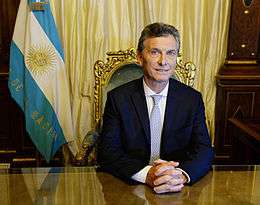
Macri took office on 10 December 2015. He began the ceremony starting from his apartment in the neighborhood of Recoleta at the corner of Avenida del Libertador and Cavia at 11:00pm to the National Congress of Argentina with his wife Juliana Awada and his youngest daughter of 4 years old, through the Casa Rosada and the Plaza de Mayo. At 11:41 he entered the room where the Legislature was, taking an oath after the Vice President Gabriela Michetti. Then he delivered a speech of 27 minutes in which he pledged his "support for an independent judiciary, fight corruption and drug trafficking, the internal union of Argentina, universal social protection, create a XXI-century style of education and that everyone can have a roof, water and sewer". Also greeted his competitors during the presidential elections.[7]
Later he went to the Casa Rosada, where he received the presidential attributes in the White Hall of the hands of the Temporary President of the Senate, Federico Pinedo, accompanied by Vice President Gabriela Michetti, president of the Chamber of Deputies Emilio Monzó and President of the Supreme Court Ricardo Lorenzetti. Minutes later came the historic balcony where thousands of people waited in the Plaza de Mayo, expressing his hope that "the Argentines can live better, starting a wonderful time for our country, always telling the truth, being honest, showing the problems " and calling " the Argentines to accompany management and alerting when he mistake".[8]
After being anointed President, he gave a reception at the San Martín Palace of Argentina Foreign Ministry to all the heads of state present: Michelle Bachelet from Chile, Horacio Cartes from Paraguay, Juan Manuel Santos from Colombia, Rafael Correa from Ecuador, Evo Morales from Bolivia, Dilma Rousseff from Brazil, and representatives of other countries attending his inauguration.[9]
Foreign relations
During his government, Macri wants to strengthen ties with Brazil and the Southern Cone, looking away from the Bolivarian axis and claim for political prisoners in Venezuela. It will also promote the repeal of the agreement with Iran and work for a rapprochement with the United States and Europe.[10]
Latin America
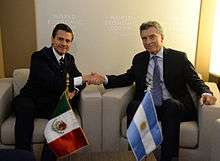
After being elected President, Macri received many congratulations from other Latin American Presidents. Despite the ruling Workers' party having supported Daniel Scioli during the campaign, Brazilian President, Dilma Rousseff congratulated Macri and invited him to a state visit "as soon as possible", while she is also set to attend Macri's inauguration as president. The pair have stated that improving bilateral relations between the two countries, as well as strengthening the Mercosur trade bloc.[11] The Chilean President, Michelle Bachelet contacted Macri by phone and spoke about the importance for both countries which can maintain the spirit of cooperation, integration and development which characterizes their common history and the importance of further work for Latin America.[12] Juan Manuel Santos expressed "Congratulations to Mauricio Macri for his victory in presidential elections in Argentina. Successes in his management. It has our full support"[13] The President of Ecuador, Rafael Correa congratulated Macri for his victory and wished him "the best of luck". While commenting on the presidencies of the Kirchners, he stated that "12 years ago Argentina was reborn like a phoenix, after neoliberalism had left it in ashes" whilst thanking the former President Cristina Fernández de Kirchner.[14] President of Mexico, Enrique Peña Nieto stated that "Mexico will work with" Macri's government to strengthen "bilateral relations and the wellbeing of Latin America".[15] Peruvian President Ollanta Humala contacted with Macri in order to congratulate him on his election victory and point out that the Peruvian Government has "strong will" to strengthen ties with his country, reported the Peruvian Foreign Ministry.[16] Uruguayan president Tabaré Vázquez greeted Mauricio Macri in a telephone interview for his victory in presidential runoff and asked him to convey the congratulations to the people of Argentina for the civic maturity demonstrated during the election.[17]
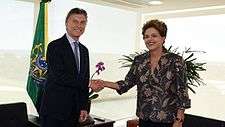
Immediately after the elections, Macri announced that he would ask for the invocation of Mercosur's "democratic clause" (limiting membership to democracies) with regard to Venezuela, since the government of Nicolás Maduro was not respecting democratic doctrines. He called for the holding of the 2015 Venezuelan elections without electoral fraud or tricks to avoid the result, and the release of political prisoners. In the end Maduro acknowledged the defeat of his party in the elections.[18] Nevertheless, Macri made diplomatic requests for the political prisoners in the first meeting of Mercosur that he attended.[19] Venezuela's opposition hailed Macri's presidential win in Argentina as a blow for leftists in Latin America and a good omen for their own duel with Chavism in next month's parliamentary vote. "That was a big disappointment for Venezuela's ruling socialist "Chavismo" movement, which had a close political alliance with Fernández."[20] Diosdado Cabello called Macri a "fascist", and asked him to stay away of Venezuelan internal affairs, as Macri had proposed to remove Venezuela from the Mercosur because of the treatment to Leopoldo López and other political prisoners.[21]
On November 5, Macri made his first trip as President-elect to Brazil, where he met with President Dilma Rousseff in Brasilia. Macri said he chose Brazil as the first trip as President-elect because it is the main commercial partner of Argentina and because the strong ties that both countries have.[22] That same day Mauricio Macri traveled to Santiago de Chile where he was received by President Michelle Bachelet in the Palacio de la Moneda.[23]
United States
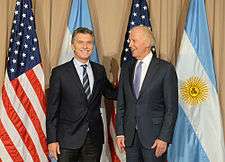
The United States Secretary of State John Kerry congratulated the country for its "successful elections", adding that he was "looking forward to working closely" with Macri and his government.[24] Meanwhile, United States Ambassador to Argentina Noah Mamet wished Macri well.[15] Members of the United States House of Representatives later asked Barack Obama in a letter to prioritise US-Argentine relations during 2016, stating that "The United States and Argentina should be natural partners. Both have highly educated populations, diversified economies and vast natural resources" and calling such a relationship a "win-win" for both countries. The letter also stressed the importance of reversing high levels of anti-americanism in the country and resolving the holdout problem with the Vulture Funds, among other key issues.[25] Obama later congratulated Macri personally, while an official White House statement confirmed that the President intends to strengthen ties.[26] The relations between Argentina and the United States began to twitch due to the problem that came into the Argentine Government and the Vulture fund, where former President Cristina Fernández de Kirchner stated after the latter denial of certiorari that her country had an obligation to pay its creditors, but not to become the victims of extortion by speculators; even if Argentina can't use the U.S. financial system to do so, she said, teams of experts are working on ways to avoid such a default and keep Argentina's promises.[27] The expiration of Rights Upon Future Offers (RUFO) in December 2014 will preclude other bondholders from suing for better terms should the Argentine Government and the Vulture funds settle, making such a settlement all the more likely after that date should the dispute continue.
On February 18, 2016, a White House official announced that President Obama will undertake a visit to Argentina on March 23 and 24 to improve the Argentina–United States relations. He will meet with President Macri in the Casa Rosada of Buenos Aires, being the first trip of Obama to Argentina, and the first trip to be made by an American President since George W. Bush in 2005.[28]
Europe
Many European leaders publicly expressed support for the new government of Macri. German Chancellor Angela Merkel congratulated Macri and requested that he make a state visit to Germany. She added that the two countries have "always been deeply tied", particularly in the area of science which she deemed "one of the pillars" of the two countries' relations. Merkel also remarked that she would be "thankful" if the countries could strengthen cooperation "in all areas".[29] Spanish Prime Minister Mariano Rajoy, who has a close relationship with Macri, congratulated him and invited him to carry out a state visit "as soon as possible", stating that he is confident that the new government will "lead this new stage with success" while offering "the necessary support to consolidate the historical ties of friendship, fraternity and cooperation". The relationship between Spain and Argentina had become increasingly tense under the presidency of Cristina Kirchner, particularly after the Renationalization of YPF in 2012.[30] In a telegram to Macri, Russian President Vladimir Putin expressed his hopes that the two countries will continue to increase the "bilateral cooperation within diverse areas and the coordination of efforts to resolve current occurrences within the international agenda", adding that "the fundamental intesests of the people of Russia and Argentina contribute to guarantee the stability and security of Latin America and the world", while reminding Macri that the countries had recently celebrated 130 years of diplomatic relations. Putin also made reference to the ongoing nuclear power and hydrocarbon extraction projects between the countries.[31] In February 2016, Macri received the President of Bulgaria, Rosen Plevneliev at the Casa Rosada in Buenos Aires. Both leaders spoke of investments in each country; Plevneliev also met with entrepreneurs and visited the National Congress.[32]
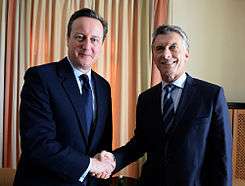
Italian Prime Minister Matteo Renzi called Macri on the night of his victory and stated that he will meet soon with the new president to "open a new page of collaboration between the two countries". He also highlighted the historical and cultural ties between the two countries, stating that "it is the country with the largest presence of Italian citizens in the world", numbering some 900,000. The Cambiemos victory also provoked much reaction in the domestic Italian press.[33] In 15 and 16 February 2016 Matteo Renzi met with Macri for a state visit to Buenos Aires;[34] Renzi was the first European leader to met Macri after the 2015 presidential election and the first Italian Prime Minister since Romano Prodi in 1998, to visit Argentina.[35]
French President François Hollande sent a telegram to Macri and expressed "We will have the opportunity at that time to deepen our dialogue and our bilateral relationship that is one of the densest known to the Latin American continent". Hollande also confirmed a state visit to Argentina in February 2016.[36] Upon congratulating President Macri on his victory in the 2015 election, President Hollande announced that he will visit Argentina in February 2016. During his state visit to Buenos Aires on 24–25 February 2016, Macri and Hollande signed 20 bilateral agreements.[37]
After being elected President, British Prime Minister David Cameron called Macri to congratulate him and offered his support for his presidency. A Downing Street spokesperson stated that "both leaders expect to meet in the near future", emphasising trade relations and investments, while also prioritising the establishment of a free trade agreement between MERCOSUR and the European Union "as soon as possible".[38]
The chancellor Susana Malcorra clarified that Argentina would maintain the Argentine claim in the Falkland Islands sovereignty dispute, but would also try to expand the Argentina–United Kingdom relations into other areas of interest.[39] Macri met with Prime Minister of the United Kingdom, David Cameron. The meeting was in the framework of the World Economic Forum in Davos, Switzerland, to which Argentina officially returned this 2016 after 12 years. After the meeting, Macri said he had a "very nice meeting" with Cameron and explained in a brief meeting with journalists that the goal of management is to initiate "a relationship in which all issues on the table are placed under one umbrella". Chancellor Susana Malcorra reported that the dispute over the sovereignty of the Falkland Islands is one of the most important axes of the meeting, but not the only one. "Focusing our relationship only in the Islands is to stay with the glass half full" said the minister.[40]
Middle East
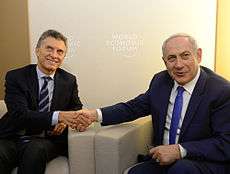
On December 21, government lawyers withdrew an appeal in Federal Court made by Macri's predecessor, Cristina Fernández de Kirchner, over the constitutionality of a memorandum she had signed with the Iranian government, to investigate the 1994 AMIA bombing. The memorandum was criticized by both Israel and Argentina's Jewish community, as Iran was long suspected of being involved in the attack. The memorandum had been ruled unconstitutional by a federal court during Kirchner's administration, and along with the withdrawal of the appeal, the memorandum was voided by Macri's administration. The move was praised by Israeli Prime Minister Benjamin Netanyahu as an improvement of bilateral relations.[41]
Cabinet
On the following days of the election, Macri and his team revealed the composition of the future cabinet. The cabinet is fully new, with the exception of Lino Barañao, who will continue as Minister of Science and Technology, having occupied the office since 2007 under Cristina Fernández de Kirchner administration.
| Position/Office | Incumbent | Image | Party | In Office | |
|---|---|---|---|---|---|
| Chief of the Cabinet of Ministers | Marcos Peña | .jpg) | PRO | 10 December 2015–present | |
| Ministry of Economy and Finances | Alfonso Prat Gay |  | CC-ARI | 10 December 2015–present | |
| Ministry of Production | Francisco Adolfo Cabrera | 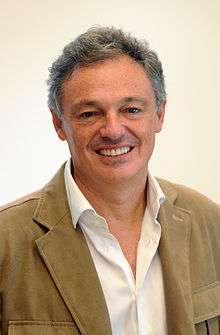 | PRO | 10 December 2015–present | |
| Ministry of Energy and Mining | Juan José Aranguren |  | PRO | 10 December 2015–present | |
| Ministry of Agriculture | Ricardo Buryaile |  | UCR | 10 December 2015–present | |
| Ministry of Tourism | Gustavo Santos | 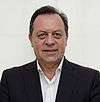 | PJ | 10 December 2015–present | |
| Ministry of Social Development | Carolina Stanley |  | PRO | 10 December 2015–present | |
| Ministry of Health | Jorge Lemus | .jpg) | PRO | 10 December 2015–present | |
| Ministry of Education and Sports | Esteban Bullrich | 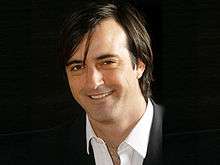 | PRO | 10 December 2015–present | |
| Ministry of Labour, Employment and Social Security | Jorge Triaca | | PRO | 10 December 2015–present | |
| Ministry of Culture | Pablo Avelluto | - | PRO | 10 December 2015–present | |
| Ministry of Justice and Human Rights | Germán Garavano |  | Independent | 10 December 2015–present | |
| Ministry of Security | Patricia Bullrich | .jpg) | CC-ARI | 10 December 2015–present | |
| Ministry of Defense | Julio Martínez | - | UCR | 10 December 2015–present | |
| Ministry of Transportation | Guillermo Dietrich | _(cropped).jpg) | PRO | 10 December 2015–present | |
| Ministry of the Interior, Public Works and Housing | Rogelio Frigerio | .jpg) | PRO | 10 December 2015–present | |
| Ministry of Foreign Affairs and Worship | Susana Malcorra | .jpg) | Independent | 10 December 2015–present | |
| Ministry of Communications | Oscar Aguad |  | UCR | 10 December 2015–present | |
| Ministry of the Environment and Sustainable Development | Sergio Bergman | .jpg) | PRO | 10 December 2015–present | |
| Ministry of Public Media | Hernán Lombardi |  | PRO | 10 December 2015–present | |
| Ministry of Science and Technology | Lino Barañao |  | PJ-FpV | 10 December 2007–present | |
| Ministry of Modernization | Andrés Ibarra |  | PRO | 10 December 2015–present | |
| Secretary General of the Presidency | Fernando de Andreis | _(cropped).jpg) | PRO | 10 December 2015–present | |
| Belgrano Plan Responsible | José Cano |  | UCR | 10 December 2015–present | |
| Director of the Federal Administration of Public Revenue | Alberto Abad | - | Independent | 10 December 2015–present | |
Economic policy
One of the first changes to economic policy from the Macri administration, just seven days after Macri had taken office, was to remove the currency controls that had been in place for four consecutive years.[42][43] The move signified a 30% devaluation of the peso, and was met with both criticism and praise.[44][45][46]
In December 2015, Macri's administration removed taxes on exports of grain, beef and fish, while keeping a 30% export tax on soy, down 5% from a previous rate of 35%.[47][48] The administration also did away with previously imposed quotas on grain exports.[49]
On January 19, 2016, Macri attended the World Economic Forum in Davos, Switzerland with Sergio Massa and part of his cabinet looking for investments. He had meetings with various business representatives, politicians and journalists. Some of them were US Vice President Joe Biden, the Prime Minister of the United Kingdom, David Cameron, the founder of Virgin Group Richard Branson, CEO of Google Eric Schmidt, the Queen of the Netherlands, President and CEO Coca Cola, Muhtar Kent among others.[50] It was the first time that Argentina participates in the Forum since 2003. The last president was Eduardo Duhalde.[51]
One of the Macri's promises during the campaign was the elimination of Income tax for workers, saying "During my government workers will not pay tax on profits".[52] The Minister of the Economy and Public Finances, Alfonso Prat-Gay said that the draft amendments to the income tax will be sent to Congress for treatment on March 1, 2016.[53]
References
- ↑ Jonathan Watts and Uki Goñi (22 November 2015). "Argentina election: second round vote could spell end for 'Kirchnerism'". The Guardian. Retrieved 21 November 2015.
- ↑ "¿En qué consiste el "Plan Belgrano" de Mauricio Macri para desarrollar el norte del país?". www.lanacion.com.ar. Retrieved 2015-11-26.
- ↑ ""Plan Belgrano": el programa de inversiones para el Norte que anunciará Macri en el nuevo tramo de la campaña". Terra. Retrieved 2015-11-26.
- ↑ "En Tucumán, Mauricio Macri presentó sus propuestas para el desarrollo del norte del país | Mauricio Macri - Infobae". Retrieved 2015-11-26.
- ↑ "Marcos Peña anunció el Gabinete de Mauricio Macri: Prat Gay va a Hacienda y Patricia Bullrich a Seguridad". www.lanacion.com.ar. Retrieved 2016-01-27.
- ↑ Copesa, Grupo. "Mauricio Macri anuncia su gabinete para su gobierno en Argentina". www.latercera.com. Retrieved 2016-01-27.
- ↑ "Las 20 frases del discurso de Macri durante la asunción como presidente". Clarin. 10 December 2015.
- ↑ "Macri, desde el balcón de la Rosada: "Los argentinos merecíamos vivir mejor"". Clarin. 10 December 2015.
- ↑ "Tras asumir la presidencia, Macri se reúne con las delegaciones extranjeras en el Palacio San Martín". La Nacion. 10 December 2015.
- ↑ "Macri impulsará un giro en la política exterior". La Nacion. 24 November 2015. Retrieved 24 November 2015.
- ↑ Armendariz, Alberto (23 November 2015). "Dilma Rousseff felicitó a Macri y lo invitó a reunirse en Brasilia". La Nacion. Retrieved 23 November 2015.
- ↑ "Presidenta de Chile se comunico con Mauricio Macri". Telam. 22 November 2015. Retrieved 23 November 2015.
- ↑ "Juan Manuel Santos felicitó a Mauricio Macri". Infobae. 22 November 2015. Retrieved 24 November 2015.
- ↑ "Rafael Correa felicitó a Mauricio Macri por la victoria en el ballottage". La Nacion. 23 November 2015. Retrieved 23 November 2015.
- 1 2 "Macri anticipó su agenda internacional: Brasil y la Alianza del Pacífico". La Nacion. 23 November 2015. Retrieved 24 November 2015.
- ↑ "Humala a Macri: Avancemos en la agenda bilateral entre el Perú y Argentina". Americatv. 23 November 2015. Retrieved 23 November 2015.
- ↑ "Vázquez felicitó a Macri". Republica. 24 November 2015. Retrieved 24 November 2015.
- ↑ Stuenkel, Oliver (December 7, 2015). "Maduro's acceptance of election results is early foreign policy win for Macri". Post-Western World. Retrieved December 16, 2015.
- ↑ "Macri, en la cumbre del Mercosur: "Pido por la pronta liberación de los presos políticos en Venezuela"" [Macri, in the Mercosur summit: "I ask for the swift liberation of the political prisoners in Venezuela"] (in Spanish). La Nación. December 21, 2015. Retrieved December 17, 2015.
- ↑ "Venezuela opposition cheer Macri's Argentina presidential win". Reuters. November 23, 2013. Retrieved November 23, 2015.
- ↑ Reuters (November 26, 2015). "Diosdado Cabello, el hombre fuerte de Venezuela, llamó "fascista" a Macri y le advirtió: "No se meta con nosotros"" [Diosdado Cabello, the strongman of Venezuela, called Macri a "fascist" and warned: "Do not mess with us"] (in Spanish). La Nación. Retrieved November 23, 2015.
- ↑ "Dilma recibe a Macri en Brasilia". Diario Jornada. 5 December 2015. Retrieved 5 December 2015.
- ↑ "Bachelet recibió a Macri en Santiago de Chile". Infobae. 5 December 2015. Retrieved 5 December 2015.
- ↑ "John Kerry: "Espero trabajar en estrecha colaboración con Mauricio Macri"". La Nacion. 23 November 2015. Retrieved 24 November 2015.
- ↑ "Tras el triunfo de Macri, legisladores de EE.UU. le piden a Barack Obama que "priorice las relaciones con la Argentina"". La Nacion. 25 November 2015. Retrieved 26 November 2015.
- ↑ "Barack Obama felicitó a Mauricio Macri y se comprometió a trabajar en el sector energético". La Nacion. 25 November 2015. Retrieved 26 November 2015.
- ↑ "Argentina: Won't submit to 'extortion' on debt". www.sfgate.com. Associated Press. 16 June 2014.
- ↑ "Obama to Visit Argentina on Mar. 23 and 24". Telam. February 18, 2016.
- ↑ "Angela Merkel felicitó a Mauricio Macri y lo invitó a Alemania". La Nacion. 24 November 2015. Retrieved 24 November 2015.
- ↑ Rodríguez Yebra, Martín (23 November 2015). "Mariano Rajoy felicitó a Mauricio Macri y lo invitó a España". La Nacion. Retrieved 23 November 2015.
- ↑ "Putin le mandó un telegrama a Macri para saludarlo por el triunfo". La Nacion. 23 November 2015. Retrieved 23 November 2015.
- ↑ "Mauricio Macri recibió al presidente búlgaro, Rosen Plevneliev". La Nacion. 4 February 2015. Retrieved 4 February 2015.
- ↑ Piqué, Elisabetta (23 November 2015). "Matteo Renzi llamó a Macri para felicitarlo". La Nacion. Retrieved 23 November 2015.
- ↑ Renzi in Argentina
- ↑ Renzi: a young visitor from the old world
- ↑ "François Hollande felicitó a Macri por su triunfo y confirmó que vendrá al país en febrero". La Nacion. 29 November 2015. Retrieved 29 November 2015.
- ↑ "François Hollande felicitó a Macri por su triunfo y confirmó que vendrá al país en febrero". La Nacion (in Spanish). 29 November 2015. Retrieved 29 November 2015.
- ↑ "Cameron llamó a Macri para felicitarlo y ofrecerle apoyo". La Nacion. 26 November 2015. Retrieved 26 November 2015.
- ↑ "Malvinas is central for Argentina, but 'there are a lot of other areas to work with the UK'". Merco Press. December 16, 2015. Retrieved December 12, 2015.
- ↑ "Mauricio Macri se reunió con David Cameron en Davos". Infobae. 21 January 2016. Retrieved 21 January 2016.
- ↑ "New Argentina government voids pact with Iran on AMIA bombing". The Times of Israel. December 14, 2015. Retrieved December 22, 2015.
- ↑ "Argentina elimina desde hoy el "cepo cambiario"". www.elpais.com.uy (in Spanish). Retrieved 2015-12-29.
- ↑ País, Ediciones El (2015-12-17). "Argentina libera el control de capitales". EL PAÍS (in Spanish). Retrieved 2015-12-29.
- ↑ "Argentina lifts currency controls, floats peso in bid to boost economy". the Guardian. Retrieved 2015-12-29.
- ↑ "RT - Argentina anuncia fin del cepo cambiario".
- ↑ "El final del cepo: a partir de hoy se podrán comprar y vender dólares libremente". Clarin.com. Retrieved 2015-12-29.
- ↑ Mander, Benedict (2015-12-14). "Mauricio Macri scraps tax on Argentine farm exports". Financial Times. ISSN 0307-1766. Retrieved 2015-12-31.
- ↑ "Confirmado: Macri anunció retenciones cero, salvo para la soja". www.lanacion.com.ar. Retrieved 2015-12-31.
- ↑ "Argentina's Macri scraps corn and wheat export quotas". Reuters. 2015-12-29. Retrieved 2015-12-31.
- ↑ "La agenda de Mauricio Macri en Davos". La Nacion. 19 January 2016. Retrieved 2015-12-31.
- ↑ "Macri confirma viaje a Davos para primera participación argentina en 12 años". Terra. 18 January 2016. Retrieved 2015-12-31.
- ↑ "Macri Video". Mauricio Macri Official Site. October 2015. Retrieved 2015-12-31.
- ↑ "Macri dio marcha atrás con el aguinaldo". Pagina 12. 7 December 2015. Retrieved 2015-12-31.